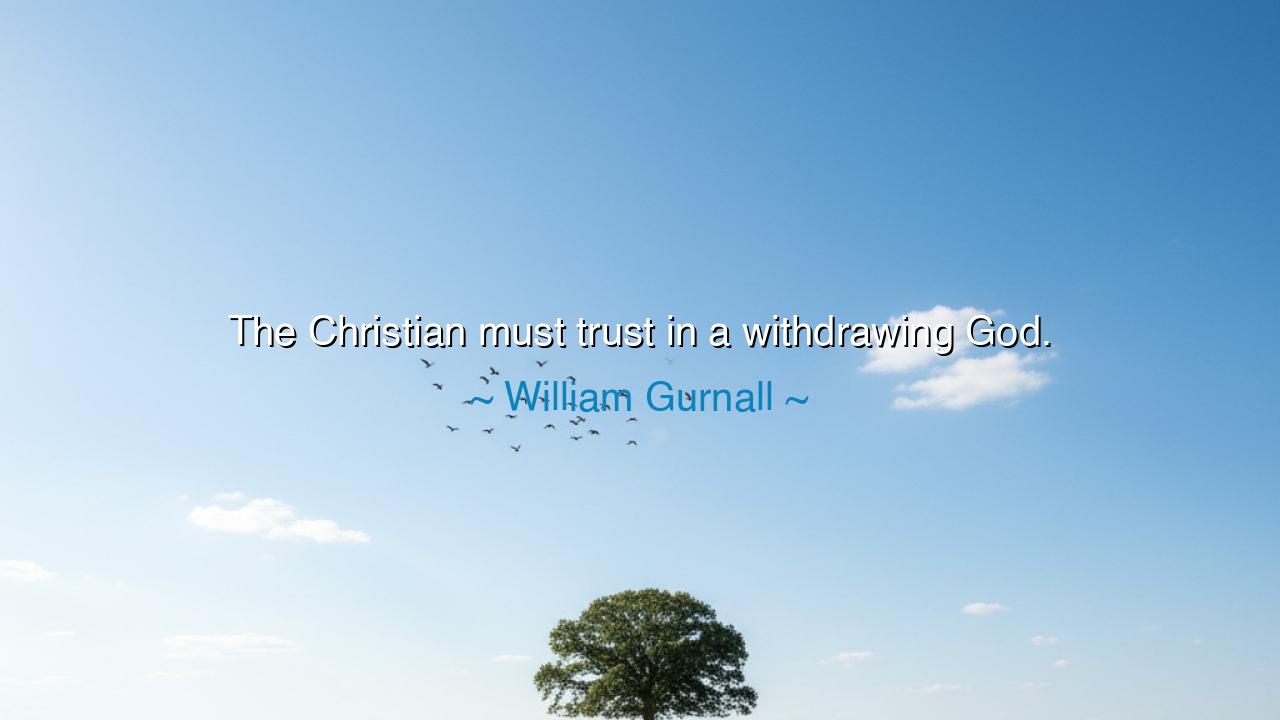
The Christian must trust in a withdrawing God.






The words of William Gurnall, a preacher of the seventeenth century, strike like a solemn bell across the ages: “The Christian must trust in a withdrawing God.” In this paradox lies a great mystery of faith. For it is easy to believe when the divine presence is near, when prayers seem answered and blessings fall like rain. But what of the hours when heaven grows silent, when the soul feels abandoned, when God seems to have withdrawn? Here, says Gurnall, lies the true test of faith: not in abundance, but in absence; not in light, but in darkness.
The ancients knew well the silence of the divine. The Psalmist cried, “My God, my God, why have You forsaken me?” Job sat among ashes, stripped of wealth, health, and family, yet still clung to his God though He seemed far away. Even Christ upon the cross uttered words of abandonment, bearing the weight of a withdrawing God. Such testimonies remind us that faith is not a constant feast of joy but often a long desert walk, where one must hold fast to trust when comfort departs.
To speak of a withdrawing God is not to say that God ceases to be, nor that His love ends. Rather, it is to say that His presence is sometimes hidden, as the sun is hidden by clouds. In these seasons, the believer learns whether their devotion rests upon gifts or upon the Giver Himself. If one worships only when blessings flow, then one loves blessings more than God. But if one can worship in silence, endure in absence, and trust in the hiddenness, then their faith is proven true, purified as gold in fire.
History gives us examples of this sacred trial. Consider the English martyrs, who were imprisoned in dark cells, facing death with no vision of deliverance. To outward eyes, God had withdrawn; their prayers for rescue seemed unanswered. Yet many went to their deaths with hymns upon their lips, trusting not in what they felt but in what they knew—that God was faithful even when unseen. Their courage became a testimony to generations after them.
The deeper meaning of Gurnall’s words is heroic: the strength of the soul is revealed not in moments of divine nearness but in the endurance of divine distance. To trust in a withdrawing God is to declare that faith does not depend upon emotion, nor upon constant consolation, but upon the eternal truth of God’s character. This is not shallow belief but battle-tested devotion. It is the faith of the soldier who marches even when the commander is out of sight, the loyalty of the lover who remains steadfast though parted from their beloved.
The lesson is clear: do not despair when you feel abandoned, nor imagine that the silence of heaven means the absence of God. In such times, your faith is not dying but being strengthened. Learn to stand firm, to pray even when the skies are empty, to sing even when the heart is heavy. This is the faith that grows roots deep into eternity, that cannot be shaken by drought or storm.
Practical actions follow: when you feel the presence of God withdraw, do not cease from prayer, but pray all the more. Read the testimonies of those who endured such silences before you, for their stories will strengthen your heart. Recall the blessings of the past, and let memory feed your trust. Serve others in love, for even in the darkness, your actions can shine with light. Above all, hold fast—knowing that the withdrawing God is still the faithful God, and that the silence is but a season, not the end.






BHLe Bao Han
William Gurnall's statement challenges the common notion of a consistently present and involved God. If God withdraws, what does it mean for believers who are taught to seek His presence constantly? How does trust in a withdrawing God shape the way Christians respond to hardship, unanswered prayers, or feelings of abandonment? Is this withdrawal part of a larger spiritual journey, or is it a test of faith?
DXDong Duong Xuan
Gurnall’s quote about trusting a withdrawing God raises a difficult but important point about faith. In moments of silence or perceived absence, how do we continue to trust in God’s plan? Does this absence indicate a lack of care, or does it serve to deepen one’s trust in ways we don’t immediately understand? What can we learn about God’s character during these times of withdrawal?
HNHien Nguyen
William Gurnall’s idea that Christians must trust in a withdrawing God is thought-provoking. Does this suggest that periods of spiritual silence or distance from God are necessary for growth? How do Christians find strength in moments where they feel abandoned? Can trusting in a God who seems withdrawn lead to a deeper, more mature faith, or does it create inner conflict and feelings of doubt?
PHPham Huong
This quote by Gurnall makes me reflect on the nature of trust and belief. Trusting in a God who withdraws seems difficult, especially when we expect constant comfort or guidance. Does this withdrawal signify spiritual growth or a deepening of faith? Can true trust only emerge when we learn to rely on God’s presence even when we don’t feel Him? How does this idea of withdrawal shape the way Christians approach their faith?
BNBUI NGUYEN BICH NGOC
Gurnall's idea of trusting in a withdrawing God seems to challenge the common belief that faith is about constant presence and reassurance. Does this imply that trust in God is strongest when we feel abandoned or left alone? How do Christians reconcile moments of doubt or silence from God with their faith? Is there a deeper purpose in these times of withdrawal that ultimately strengthens one’s relationship with God?